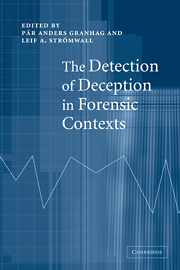Book contents
- Frontmatter
- Contents
- List of figures
- List of tables
- List of contributors
- Part 1 Introduction
- Part 2 Lie-detection techniques
- Part 3 Special issues facing a lie-catcher
- Part 4 Enhancing lie-detection accuracy
- 10 Practitioners' beliefs about deception
- 11 Training to detect deception from behavioural cues: attempts and problems
- 12 The wizards of deception detection
- 13 Guidelines to catch a liar
- Part 5 Conclusions
- Index
- References
10 - Practitioners' beliefs about deception
Published online by Cambridge University Press: 22 September 2009
- Frontmatter
- Contents
- List of figures
- List of tables
- List of contributors
- Part 1 Introduction
- Part 2 Lie-detection techniques
- Part 3 Special issues facing a lie-catcher
- Part 4 Enhancing lie-detection accuracy
- 10 Practitioners' beliefs about deception
- 11 Training to detect deception from behavioural cues: attempts and problems
- 12 The wizards of deception detection
- 13 Guidelines to catch a liar
- Part 5 Conclusions
- Index
- References
Summary
The aim of this chapter is to provide an overview of research on beliefs about deception – especially practitioners' beliefs. Specifically, we will outline which beliefs on deception professionals hold and compare these with what is known about actual (objective) differences between liars and truth-tellers. Then we will discuss how these beliefs have arisen, why they survive, how they spread, and to what they might lead. Finally, we will suggest how one might come to terms with misconceptions and false beliefs.
In the present chapter we define belief as a (strong or weak) feeling or conviction that something is true or real. The beliefs that a person holds, irrespective of whether these are correct or not, are often reflected in his or her behavioural disposition (Eichenbaum and Bodkin, 2000). Since beliefs often guide action, it is important to study people's beliefs about deception in order to learn more about why people fail and succeed in their endeavour to catch lies.
In the deception literature, there are an abundance of studies on deception detection accuracy. Many studies report low accuracy in human lie detection (Kraut, 1980; Vrij, 2000). The most commonly given reason for the low accuracy is that there is a mismatch between what actually is indicative of deception and what people believe is indicative of deception (Vrij, 2000).
Beliefs about deception
How does one find out people's beliefs about deception?
Information
- Type
- Chapter
- Information
- The Detection of Deception in Forensic Contexts , pp. 229 - 250Publisher: Cambridge University PressPrint publication year: 2004
References
Accessibility standard: Unknown
Why this information is here
This section outlines the accessibility features of this content - including support for screen readers, full keyboard navigation and high-contrast display options. This may not be relevant for you.Accessibility Information
- 116
- Cited by
